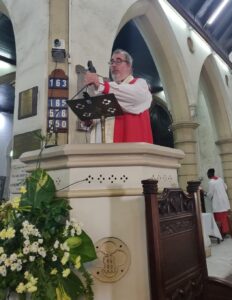Representatives from The Scottish Episcopal Church, alongside ecumenical partners the Church of Scotland and the United Reformed Church, recently arrived in Jamaica to begin a pilgrimage during this Easter season.
The intention of the ecumenical pilgrimage is to learn about the legacies of slavery and the part of churches in it.
The Primus, Most Rev Mark Strange is one of the pilgrims, alongside the moderators of the Church of Scotland and the United Reformed Church, Rt Rev Sally Foster-Fulton and Rev Dr Tessa Henry-Robinson, and other representatives of the three churches and Christian Aid.
The focus of the pilgrimage is on ‘repairing relationships’, and will involve meeting with churches, politicians, universities, and visiting former plantation sites, alongside time for spiritual reflection.
The group will learn about the continuing impact of historic slavery in Jamaica, which will help those taking part to consider how to confront a difficult past as well as affirming the ongoing relevance of the issue.
Although the pilgrimage is ecumenical, the churches taking part are all at different stages in this journey. It is expected that learnings will feed into work that has begun on the issue. The Primus will also learn from the other UK churches about the work they have undertaken on their own journeys.
A key aspect of the trip will be meeting with the Anglican Diocese of Jamaica and The Cayman Islands, and the Church in the Province of the West Indies. This will include time spent with the Most Rev Howard Gregory, Archbishop of the Province of the West Indies.
It is hoped that the Scottish Episcopal Church will be able to work alongside other provinces of the Anglican Communion which are researching the legacies of slavery, particularly in the regions most affected by the ongoing impact. The Primus was also invited to preach on Sunday 7 April at St Andrew Parish Church, Half Way Tree, Kingston (pictured).
The pilgrimage is hosted by the Christian Reparations Forum, an ecumenical body which is working to address the Jamaican churches’ own legacy, as the lands of former plantations were frequently inherited by churches.
The Scottish Episcopal Church’s participation in the pilgrimage, through the Primus and Church Relations Officer Miriam Weibye, is funded by the Global Partnerships Committee, which is examining its own missional history alongside partner organisations.
The Primus said: “in recent years I have become more aware of the part played by members of our church in the historic slave trade and discovered the story of the money used to build some of our churches. The College of Bishops has begun examining this by looking at our own unconscious bias and working with USPG on the legacy of the slave trade and our place in it.”
Bishop Mark recorded a series of four updates throughout the pilgrimage, which can be viewed here:
Update 1 – 8 April
Update 2 – 9 April
Update 3 – 11 April
Update 4 – 13 April

